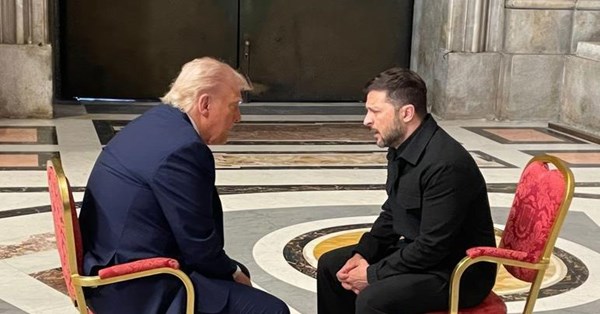THE Russian Orthodox Church has praised President Putin’s declaration of a temporary ceasefire in the war against Ukraine, although the move was dismissed as manipulative by Ukrainian leaders.
“This is not only a good-will gesture, but also a significant symbolic step — even in the most difficult circumstances, we must maintain humanity”, Vladimir Legoyda, who chairs the Synodal Department for Church-Society Relations, told Russia’s RIA-Novosti agency. “True courage means, among other things, the ability to show mercy. Let these days become a time of special prayer for a just world and for the souls of the dead,” he said.
The Orthodox official was endorsing Putin’s announcement of a halt to fighting, from 8 to 11 May, during victory celebrations on the 80th anniversary of the end of the Second World War.
In a statement on Monday, the Kremlin said that Putin’s gesture was “based on humanitarian considerations”, and highlighted Moscow’s “readiness for peace talks without preconditions” and “constructive interaction with international partners”.
Ukrainian officials, however, said that the statement had been followed by at least 100 overnight drone attacks, which killed a child and inflicted numerous injuries.
In a national message, President Zelensky dismissed the Russian declaration as “another attempt at manipulation” to “provide Putin with silence for his parade”, adding that Ukraine had proposed its own 30-day ceasefire over Easter after accepting a full ceasefire proposal by the United States in March.
The exchanges took place in the wake of Presidents Zelensky’s and Trump’s talks last weekend in St Peter’s Basilica, during the funeral of Pope Francis, which were described as “wonderful” by Trump.
In a social media post, Zelensky said that he believed the encounter had “the potential to become historic” if it protected Ukrainian lives and helped achieve a “reliable and lasting peace”.
The Primate of the Ukrainian Greek Catholic Church, Major Archbishop Sviatoslav Shevchuk, described the meeting as “touching”, and said that he hoped the Holy Spirit would now “inspire the minds and hearts of modern people, leaders of states, with the spirit of peace”.
Anatoliy Babinsky, a religion expert, told the RBC-Ukraine news website, however, that Ukrainians would count on “clear moral judgments” from a new Pope, whose electors will include the Melbourne-based Ukrainian Cardinal Mykola Bychok, who became the world’s youngest cardinal, aged 44, last December.
Mr Babinsky said that he also hoped for an “open, direct condemnation” of Russian aggression, to prevent Moscow from presenting the Holy See’s “quiet diplomacy” as “support for its actions and positions”.
In a Facebook message on Tuesday, the head of Ukraine’s independent Orthodox Church, Metropolitan Epiphany (Dumenko), requested “special prayers” for dead Ukrainian soldiers, as well as for “innocent victims, tortured prisoners, and civilians killed just for being Ukrainians”, as security police confirmed that they had restricted access to many of the country’s 10,000 cemeteries because of unexploded bombs and mines.
RIA-Novosti said that Patriarch Kirill had been rebuked by Putin during a visit by the leader of the Serbian Orthodox Church, Patriarch Porfirije, for a fresh diatribe accusing the West of succumbing to the “work of the devil” by destroying “the moral foundations of human existence”.
“You mentioned the events unfolding to our west”, Putin told Kirill in a conversation carried verbatim on his presidential website. “Yet I believe there are still individuals in the West — forces, spiritual forces — striving to restore relations and revive spiritual foundations”.
















